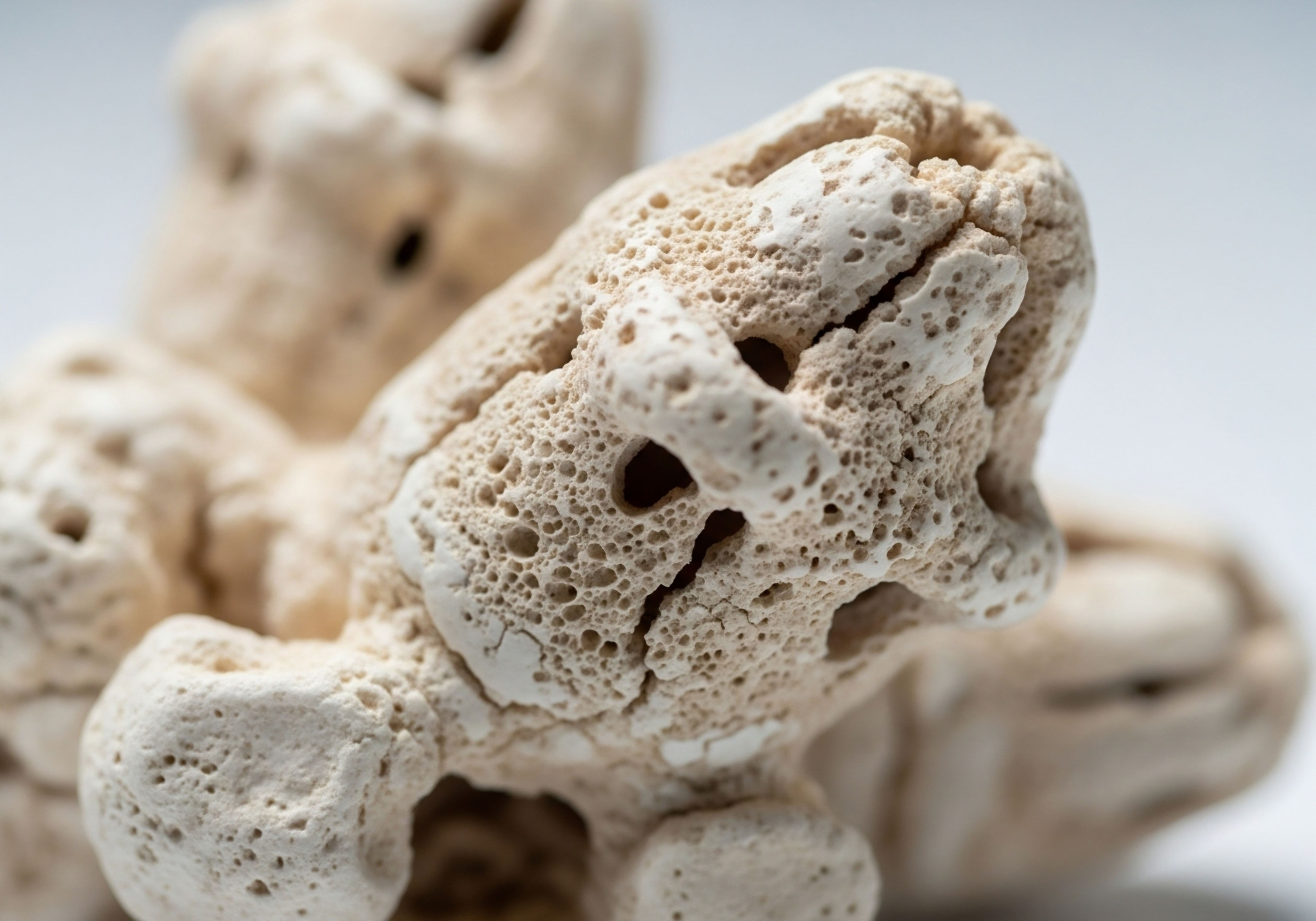

Fundamentals
Many individuals experience a subtle yet pervasive sense of unease, a diminishment of vitality that often defies easy explanation. This feeling, characterized by persistent fatigue, shifts in mood, or an inexplicable difficulty with weight management, often signals a deeper conversation occurring within the body’s intricate communication network ∞ the endocrine system. These internal dialogues, mediated by hormones, profoundly influence our daily experience, from our energy levels to our cognitive clarity.
A central question frequently arises ∞ can intentional shifts in daily living truly recalibrate established endocrine dysfunctions without the constant reliance on pharmaceutical interventions? The answer, supported by a growing body of clinical evidence, affirms the remarkable adaptability of our biological systems. Understanding your own biology represents the initial step in a profound personal journey, a path toward reclaiming optimal function and well-being.
The endocrine system orchestrates countless bodily processes, employing hormones as its messengers. When these messengers become imbalanced, the symphony of health can falter, leading to symptoms that affect every aspect of life. Consider the profound impact of daily choices on these delicate biochemical balances. Lifestyle factors, including dietary patterns, physical activity, restorative sleep, and effective stress management, collectively serve as powerful modulators of hormonal health. Each element contributes uniquely to the body’s capacity for self-regulation and restoration.
Reclaiming vitality begins with recognizing the body’s inherent capacity for healing through mindful lifestyle adjustments.
This holistic perspective acknowledges the interconnectedness of our physiological systems. The body possesses an innate intelligence, a finely tuned mechanism capable of responding to environmental cues. When these cues are consistently aligned with optimal human physiology, the potential for reversing certain endocrine imbalances without pharmacological support becomes a tangible reality. The journey toward enhanced well-being involves a deliberate cultivation of practices that honor this biological wisdom, allowing the body to return to a state of equilibrium.

The Endocrine System’s Dynamic Nature
Hormones, these potent chemical signals, circulate throughout the bloodstream, influencing nearly every cell and organ. Their actions are meticulously regulated through complex feedback loops, ensuring precise control over functions such as metabolism, growth, reproduction, and mood. Disruptions within these regulatory pathways can lead to conditions such as insulin resistance, polycystic ovary syndrome, or functional hypogonadism. The body’s capacity for adaptation permits a significant degree of resilience, responding positively to supportive environmental and behavioral changes.

Foundational Pillars of Endocrine Support
Four primary pillars underpin a robust strategy for supporting endocrine health through lifestyle. These elements are not isolated interventions; they represent an integrated approach to systemic recalibration.
- Nutritional Strategies ∞ Emphasizing whole, unprocessed foods, with a particular focus on balanced macronutrients and micronutrients, provides the essential building blocks and signaling molecules for optimal hormone synthesis and function.
- Movement Protocols ∞ Regular physical activity, encompassing both aerobic conditioning and strength training, enhances cellular insulin sensitivity, improves metabolic flexibility, and modulates the release of various endocrine messengers.
- Restorative Sleep ∞ Adequate, high-quality sleep is indispensable for the regeneration of endocrine glands and the rhythmic secretion of hormones, including growth hormone and cortisol.
- Stress Adaptation Techniques ∞ Chronic psychological and physiological stressors can profoundly disrupt hormonal equilibrium. Implementing effective stress management practices helps to mitigate the adverse effects of elevated cortisol and other stress hormones.


Intermediate
Transitioning from a foundational understanding, we now consider the specific clinical scenarios where lifestyle interventions demonstrate significant efficacy in ameliorating endocrine dysfunction. Many individuals experience symptoms such as persistent fatigue, unexplained weight fluctuations, or diminished libido, often signaling an underlying endocrine imbalance. These concerns are frequently rooted in conditions like insulin resistance, polycystic ovary syndrome (PCOS), or functional hypogonadism. A clinically informed approach recognizes the profound capacity of targeted lifestyle modifications to influence the underlying biological mechanisms of these conditions.
The body’s intricate signaling pathways respond dynamically to consistent behavioral inputs. This responsiveness forms the basis for how dietary adjustments, exercise regimens, and refined sleep and stress protocols can profoundly shift the trajectory of endocrine health. The goal involves not merely symptom management, but a genuine recalibration of physiological function, enabling the body to restore its intrinsic balance.
Targeted lifestyle changes can significantly recalibrate metabolic and hormonal pathways, fostering genuine physiological restoration.

Reversing Insulin Resistance through Lifestyle
Insulin resistance, a state where cells become less responsive to the hormone insulin, represents a widespread metabolic dysfunction. This condition often precedes type 2 diabetes and contributes to various other endocrine imbalances. Lifestyle interventions are remarkably potent in enhancing insulin sensitivity.
- Physical Activity ∞ Regular exercise, particularly a combination of aerobic and resistance training, significantly increases the expression of glucose transporters (GLUT4) on muscle cell surfaces. This action facilitates glucose uptake into cells, independent of insulin, thereby reducing the burden on the pancreas and improving overall insulin sensitivity.
- Dietary Adjustments ∞ Prioritizing whole, unprocessed foods, reducing intake of refined carbohydrates and added sugars, and increasing fiber consumption directly mitigates post-meal glucose spikes. This dietary pattern decreases the demand for insulin, allowing pancreatic beta cells to recover and cellular insulin receptors to regain sensitivity.
- Weight Management ∞ Achieving even a modest reduction in body weight, particularly visceral fat, dramatically improves insulin sensitivity. Excess adipose tissue, especially around organs, releases inflammatory molecules that interfere with insulin signaling.
Consider the analogy of a lock and key ∞ in insulin resistance, the cellular locks become stiff, making it difficult for the insulin key to open them. Lifestyle interventions effectively lubricate these locks and even add more locks, making the system function more efficiently.

PCOS Management and Lifestyle Interventions
Polycystic Ovary Syndrome, a complex endocrine disorder affecting reproductive-aged women, presents with hormonal dysregulation, hyperandrogenism, and often insulin resistance. Lifestyle modifications stand as the first-line therapy for PCOS, addressing its multifactorial nature.
Comprehensive lifestyle strategies for PCOS focus on improving insulin sensitivity, modulating androgen levels, and restoring ovulatory function.
| Intervention Category | Specific Strategies | Clinical Outcomes |
|---|---|---|
| Dietary Protocols | Low-glycemic index diets, DASH diet, caloric restriction, increased fiber, omega-3 fatty acids | Improved insulin sensitivity, reduced androgen levels, regulated menstrual cycles, decreased inflammation |
| Physical Activity | Aerobic exercise (moderate to vigorous), resistance training, combined programs | Enhanced insulin sensitivity, body composition improvement, reduced body fat, improved metabolic and reproductive outcomes |
| Behavioral Support | Stress management techniques, counseling, educational modules, sleep optimization | Improved mental health, enhanced adherence to lifestyle changes, better overall quality of life |

Addressing Functional Hypogonadism
Functional hypogonadism, characterized by reduced testosterone levels in men without organic damage to the reproductive axis, often correlates with metabolic derangements such as obesity and chronic illness. This condition, unlike organic hypogonadism, frequently responds to targeted lifestyle interventions.
Strategies for restoring endogenous testosterone production in functional hypogonadism prioritize systemic health improvements.
- Weight Loss ∞ A significant driver of functional hypogonadism, excess adiposity can increase aromatase activity, leading to greater conversion of testosterone to estrogen. Weight reduction, even modest amounts, can decrease this conversion and directly increase endogenous testosterone levels.
- Regular Exercise ∞ Physical activity, particularly resistance training, directly influences testosterone production and reduces the adverse effects of metabolic syndrome. Exercise also improves overall metabolic health, which in turn supports the hypothalamic-pituitary-gonadal (HPG) axis.
- Optimized Sleep ∞ Chronic sleep deprivation demonstrably impacts hormonal rhythms, including the pulsatile release of luteinizing hormone (LH) and subsequently testosterone. Prioritizing restorative sleep is a fundamental step in supporting the HPG axis.
These interventions offer benefits beyond hormonal normalization, including improved cardiovascular health, enhanced body composition, and increased overall well-being. The initial steps toward reversing functional hypogonadism involve a comprehensive commitment to these fundamental health practices.


Academic
The profound capacity for lifestyle interventions to recalibrate established endocrine dysfunction represents a compelling area of clinical and molecular inquiry. This section delves into the intricate systems-biology underpinnings, moving beyond phenotypic observations to explore the epigenetic, cellular, and neuroendocrine mechanisms that facilitate such profound physiological shifts.
Our focus centers on the dynamic interplay of the hypothalamic-pituitary-adrenal (HPA) axis, insulin signaling pathways, and the emerging role of the gut microbiome, providing a deeper understanding of how integrated wellness protocols can foster systemic reversal.
The body functions as an exquisitely integrated network, where metabolic, immune, and endocrine systems are in constant, bidirectional communication. Dysregulation in one domain invariably propagates through others, creating a complex web of interconnected pathologies. Understanding this interconnectedness reveals the powerful leverage points available through comprehensive lifestyle modifications, offering avenues for reversal that extend beyond the capabilities of single-target pharmacological agents.
Reversal of endocrine dysfunction through lifestyle is rooted in complex systems-biology, influencing epigenetic expression and cellular signaling.

The Hypothalamic-Pituitary-Adrenal Axis and Stress Adaptation
The HPA axis, a central neuroendocrine pathway, orchestrates the body’s response to stress through the pulsatile release of corticotropin-releasing hormone (CRH), adrenocorticotropic hormone (ACTH), and cortisol. Chronic psychological or physiological stressors induce persistent HPA axis activation, leading to sustained hypercortisolemia. This chronic elevation of cortisol exerts pleiotropic effects, including reduced insulin sensitivity, altered thyroid hormone metabolism, and suppression of the hypothalamic-pituitary-gonadal (HPG) axis, contributing to conditions like functional hypogonadism and central obesity.
Lifestyle interventions specifically target the modulation of HPA axis activity. Mindfulness-based practices, diaphragmatic breathing exercises, and consistent physical activity enhance parasympathetic tone, thereby dampening sympathetic overdrive and normalizing cortisol diurnal rhythms. Regular, moderate exercise, for instance, has been shown to reduce basal cortisol levels and improve the resilience of the HPA axis to acute stressors. This adaptation represents a sophisticated neuroendocrine recalibration, restoring homeostatic balance.

Insulin Signaling, Inflammation, and Epigenetic Remodeling
Insulin resistance, a cornerstone of many endocrine dysfunctions, involves impaired cellular responsiveness to insulin, leading to compensatory hyperinsulinemia. At a molecular level, this involves defects in insulin receptor signaling, including reduced phosphorylation of insulin receptor substrate (IRS) proteins and downstream activation of the PI3K/Akt pathway. Chronic low-grade inflammation, often driven by excess adiposity and dysbiotic gut microbiota, plays a significant role in this pathology by activating serine kinases that phosphorylate IRS-1 at inhibitory sites, thus uncoupling insulin signaling.
Dietary interventions, particularly those emphasizing whole, anti-inflammatory foods rich in polyphenols and fiber, directly impact this inflammatory milieu. These nutritional components can modulate the expression of inflammatory cytokines (e.g. TNF-α, IL-6) and improve gut barrier integrity, thereby reducing systemic inflammation. Furthermore, regular physical activity upregulates AMP-activated protein kinase (AMPK) activity, enhancing mitochondrial biogenesis and glucose uptake in muscle cells, directly addressing the cellular mechanisms of insulin resistance.
Emerging research also highlights the epigenetic dimension of lifestyle interventions. Dietary patterns, physical activity, and stress levels can influence DNA methylation, histone modification, and non-coding RNA expression. For example, specific nutrients can act as cofactors for enzymes involved in DNA methylation, while exercise can alter the epigenetic landscape of muscle cells, promoting a more insulin-sensitive phenotype.
These epigenetic modifications represent a powerful mechanism by which lifestyle can induce lasting changes in gene expression, leading to the reversal of established metabolic and endocrine dysfunctions.
The gut microbiome exerts profound influence over endocrine function, acting as a critical interface between lifestyle and host physiology. A dysbiotic microbiota can produce metabolites that impair insulin sensitivity, promote inflammation, and alter host hormone metabolism. Dietary fiber, a cornerstone of health-promoting diets, fosters a diverse and beneficial gut microbiome, leading to the production of short-chain fatty acids (SCFAs) like butyrate. SCFAs improve gut barrier function, reduce systemic inflammation, and enhance insulin signaling in peripheral tissues.
| Lifestyle Intervention | Primary Molecular Targets | Endocrine Impact |
|---|---|---|
| Optimized Nutrition | Inflammatory cytokine reduction, gut microbiota modulation, epigenetic regulation, nutrient sensing pathways (AMPK, mTOR) | Enhanced insulin sensitivity, reduced HPA axis activation, improved sex hormone metabolism, reduced thyroid dysfunction |
| Structured Exercise | GLUT4 translocation, mitochondrial biogenesis, AMPK activation, myokine release, HPA axis modulation | Improved glucose homeostasis, increased endogenous testosterone, reduced cortisol, enhanced metabolic flexibility |
| Restorative Sleep | Circadian clock gene expression, growth hormone pulsatility, leptin/ghrelin regulation, HPA axis dampening | Normalized hormonal rhythms, improved satiety signals, reduced stress hormone burden, enhanced cellular repair |
| Stress Adaptation | Parasympathetic nervous system activation, cortisol receptor sensitivity, neuroinflammation reduction | Reduced chronic hypercortisolemia, improved HPG axis function, enhanced emotional regulation, reduced systemic inflammation |
The sophisticated interaction between these lifestyle elements and their molecular targets underscores the scientific authority of a comprehensive wellness approach. The reversal of established endocrine dysfunction through non-pharmacological means represents a testament to the body’s remarkable capacity for self-repair when provided with the optimal internal and external environment. This deep understanding empowers individuals to make informed choices, fostering profound and lasting physiological change.

References
- American College of Lifestyle Medicine. (2025). Lifestyle Interventions For Treatment and Remission of Type 2 Diabetes and Prediabetes in Adults. (Video Lecture and Guideline Summary).
- Cleveland Clinic. (2022). Hormonal Imbalance ∞ Causes, Symptoms & Treatment.
- Freeman, A. M. Acevedo, L. A. & Pennings, N. (2023). Insulin Resistance. In ∞ StatPearls. Treasure Island (FL) ∞ StatPearls Publishing.
- Kushner, R. F. et al. (2023). Nutritional interventions to ameliorate the effect of endocrine disruptors on human reproductive health ∞ A semi‐structured review from FIGO. International Journal of Gynecology & Obstetrics, 161(2), 380-388.
- Nida, G. (2025). The Role of Lifestyle Medicine in Endocrine Health. (Podcast Interview).
- Ohlsson, C. et al. (2007). The relative contributions of aging, health, and lifestyle factors to serum testosterone decline in men. Journal of Clinical Endocrinology & Metabolism, 92(2), 549-555.
- Pasquali, R. et al. (2014). Treatment of Functional Hypogonadism Besides Pharmacological Substitution. Journal of Clinical Endocrinology & Metabolism, 99(8), 2639-2647.
- Shulman, G. I. (2024). How to Reverse Insulin Resistance. Yale School of Medicine.
- Sperling, H. et al. (2023). Eat, Train, Sleep ∞ Retreat? Hormonal Interactions of Intermittent Fasting, Exercise and Circadian Rhythm. Nutrients, 15(1), 226.
- Teede, H. J. et al. (2023). International Evidence-based Guidelines on the Assessment and Management of Polycystic Ovary Syndrome. Human Reproduction Update, 29(1), 1-19.

Reflection
As you reflect upon the profound interplay between lifestyle and endocrine health, consider the knowledge presented as a sophisticated map for your own biological systems. This understanding of intricate feedback loops and cellular mechanisms serves as a powerful foundation, guiding you toward informed choices.
Your personal health journey represents a unique expedition, and while this information provides clarity on the landscape, personalized guidance remains invaluable. The path to reclaiming vitality and function without compromise involves a continuous, informed dialogue with your own body, a commitment to consistent, supportive actions, and a recognition of your inherent capacity for profound physiological transformation.



